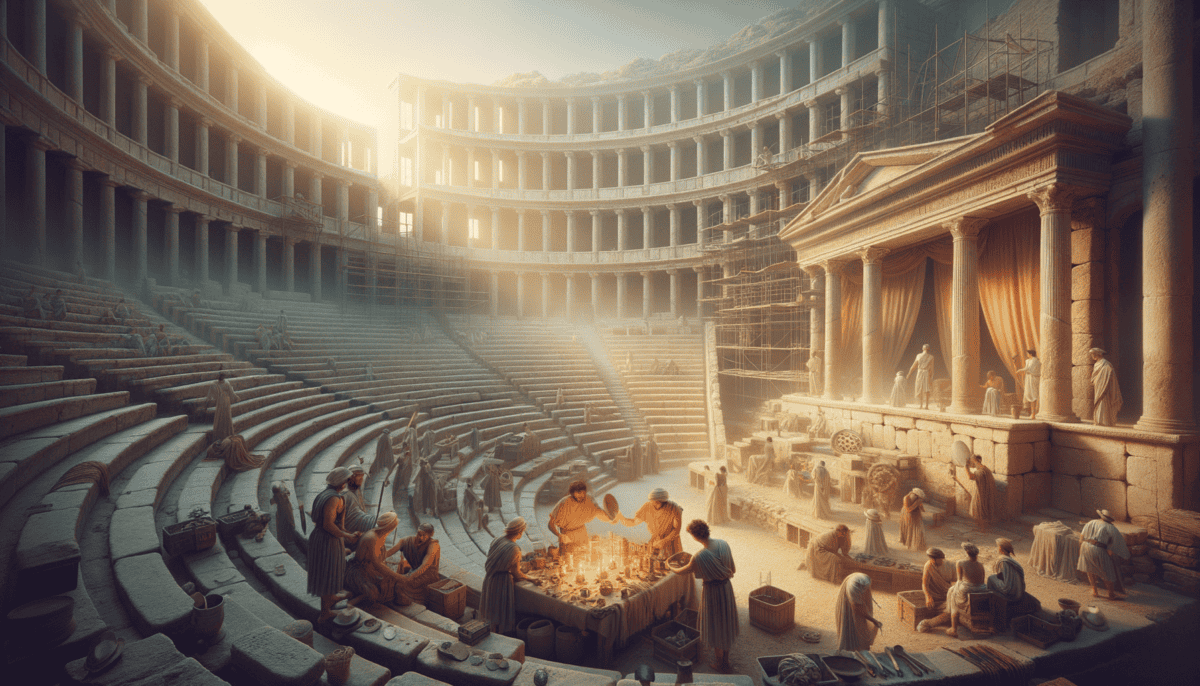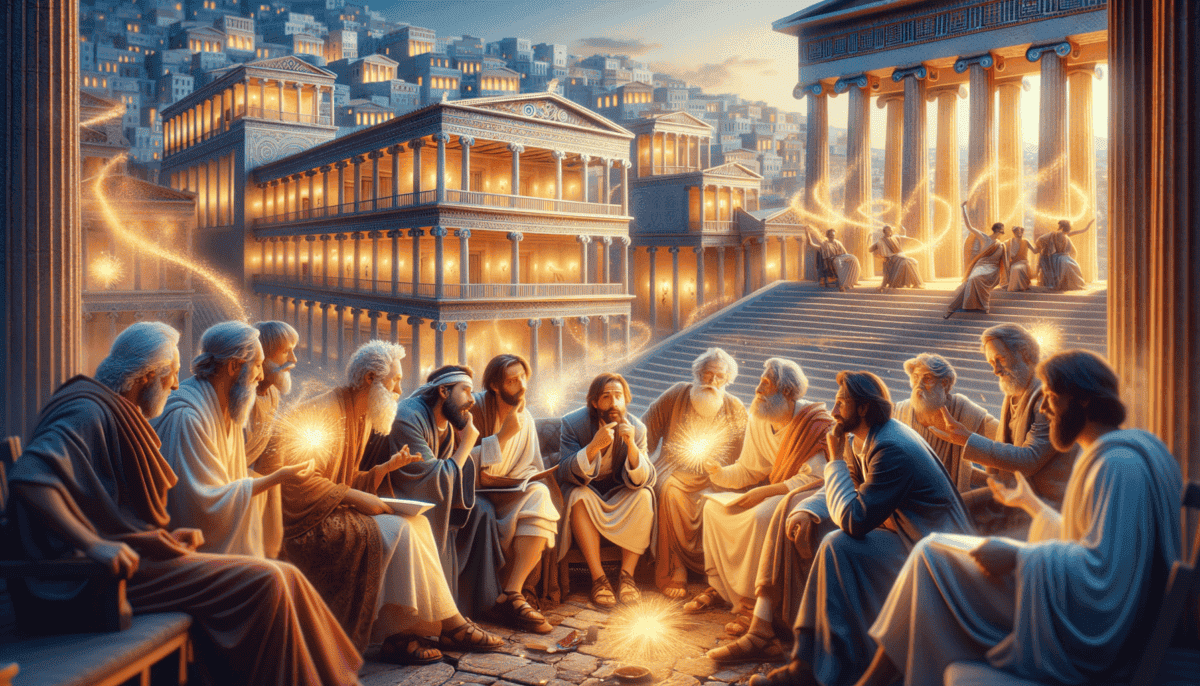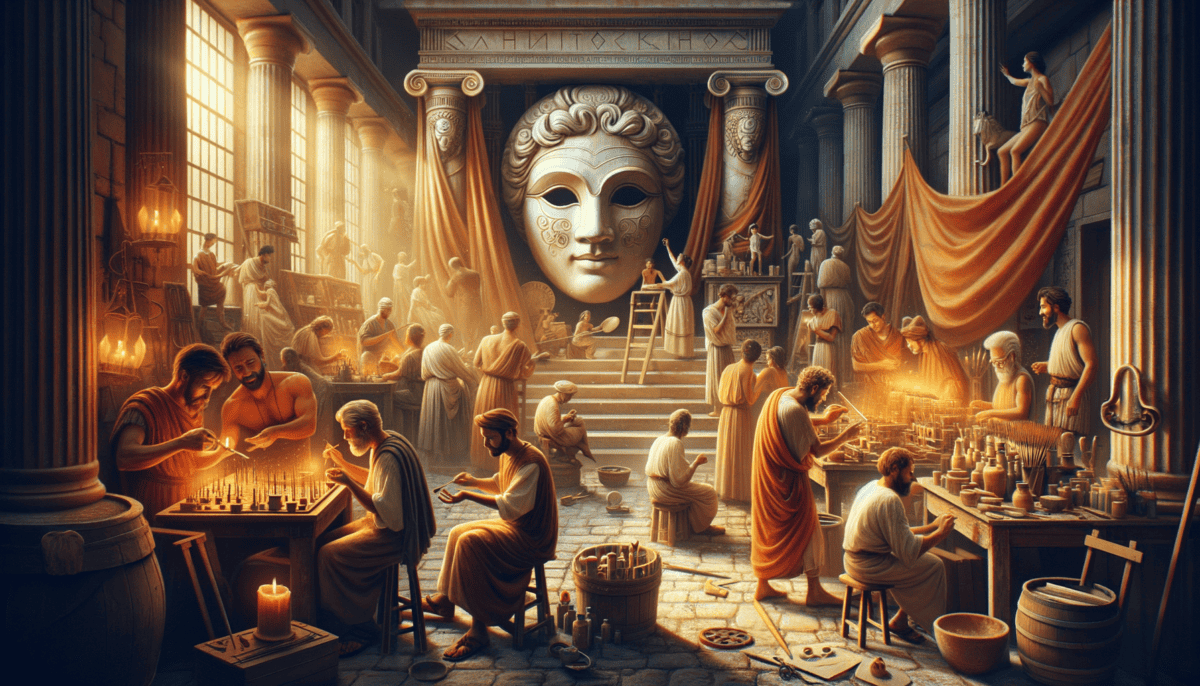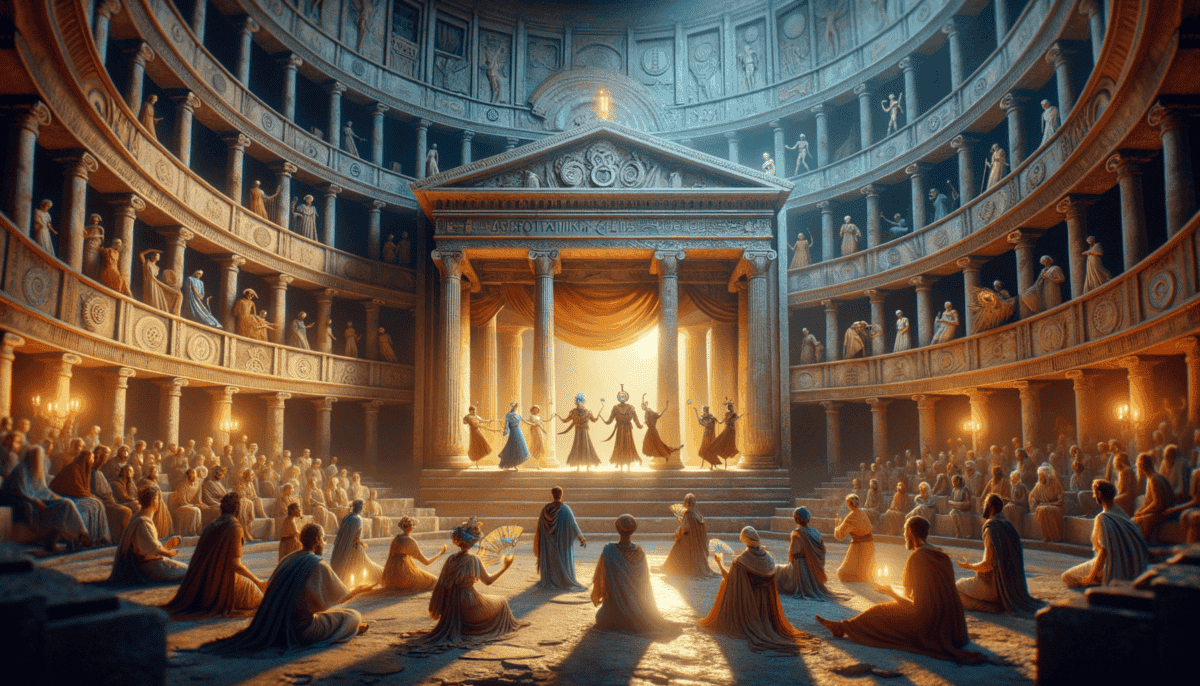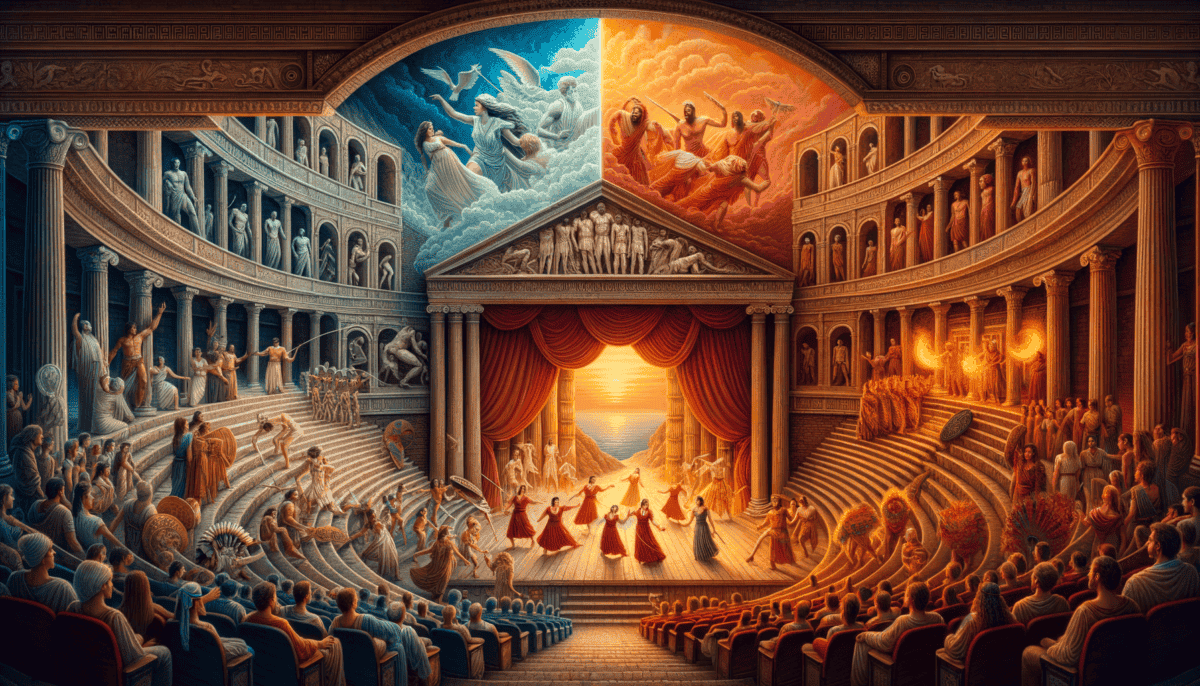A Festival for Dionysus
Long ago in Athens, Greece, something magical happened. The streets buzzed with excitement as people got ready for a big party!
"Mama, why is everyone so happy today?" little Theron asked, tugging at his mother's colorful dress.
"Today is special, my dear. It's the Festival of Dionysus!" she smiled, adjusting her flower crown.
The air smelled sweet with honey cakes and fresh flowers. People wore bright clothes and danced in the streets. Some wore grape vines in their hair. Everyone was heading to a special place on a hill.
The God Who Loved to Party
"Who is Dionysus?" Theron asked, skipping along the stone path.
His mother pointed to a big statue. It showed a happy man with curly hair and a cup in his hand. "Dionysus is our god of fun, wine, and parties. He loves when people sing and dance!"
The First Show Begins
As the sun climbed higher, everyone gathered at the hillside. Some sat on wooden benches. Others found spots on the grassy slopes. In front of them was a flat space where the magic would happen.
"Look, Mama!" Theron pointed excitedly. Men in special clothes walked into the flat space. They wore masks with big smiles or sad faces.
“Today, we honor Dionysus with stories!” announced a man in a purple robe. “Watch as we bring tales to life!”
The crowd grew quiet. Music started to play. A group of people called the chorus began to sing and dance. They told stories about heroes and gods. Some stories made people laugh. Others made them cry.
More Than Just a Party
Little Theron couldn't take his eyes off the performers. He watched as they changed masks to become different characters. The chorus sang about brave heroes and mighty gods. Their voices filled the air with music.
"This is better than any story you've told me, Mama," Theron whispered.
His mother smiled. "Yes, my son. This is something new. We're not just watching people act – we're seeing the birth of theater!"
A New Way to Tell Stories
The sun began to set, but nobody wanted to leave. The stories kept coming. Sometimes funny, sometimes sad, but always exciting. People laughed together and cried together.
That day, something special started in Athens. The Greeks found a new way to tell stories – with acting, music, and dance. They called it "theater."
As stars appeared in the sky, Theron and his mother walked home. His head was full of the amazing things he had seen. He couldn't wait to come back tomorrow for more stories.
"Can I be in a play someday, Mama?" he asked hopefully.
She squeezed his hand. "Of course you can, my little actor. Thanks to Dionysus, anyone can tell stories now!"
The Festival of Dionysus wasn't just a party anymore. It was the beginning of something bigger. The Greeks had discovered a whole new way to share stories, and the world would never be the same.
Building the First Stages
The sun rose over Athens as workers climbed the hillside. They carried wood, tools, and big pieces of stone. Something exciting was happening! ️
A Special Place for Stories
“What are they building, Papa?” asked little Theron, watching the busy workers.
“They’re making a theater,” his father smiled. “A special place just for plays!”
The Theater of Dionysus
Day by day, the theater grew bigger. Workers carved seats into the stone hillside. They made them in a half-circle shape, like a big hug around a flat space called the orchestra.
“This will be the grandest theater in all of Athens!” declared the head builder. “We’ll call it the Theater of Dionysus!”
The theater could hold thousands of people! Everyone would have a good view of the plays, no matter where they sat.
Making the Magic Happen
Behind the orchestra, workers built a special building called the skene. It had doors and looked like a house or temple.
“What’s that for?” Theron asked.
“That’s where actors change their costumes and masks,” his father explained. “It’s like a magical doorway – actors go in as one person and come out as someone else!”
The Power of Masks
Speaking of masks, they were super important in Greek plays! Mask makers worked hard to create faces that everyone could see, even from far away.
The Singing Group
The chorus had a special place too. They danced and sang in the orchestra – the flat round space in front of the seats.
“Watch us practice!” called the chorus leader. The group moved together in a circle, their voices rising up to the sky. Their songs told parts of the story and helped the audience understand what was happening.
Getting Ready for Show Time
Finally, after many months, the Theater of Dionysus was ready! It was beautiful, with its stone seats shining in the sun.
“Can we go see a play now?” Theron bounced excitedly.
“Soon,” his father laughed. “The actors are practicing their new plays. They want everything to be perfect!”
The Greek people had built something amazing. Their new theater would last for hundreds of years. Even today, people can still visit its ruins in Athens!
Now the stage was set for great stories to be told. New playwrights were already writing exciting plays. They couldn’t wait to share their stories in this wonderful new theater.
The Great Storytellers
The morning sun peeked over the Theater of Dionysus. Three men sat together, talking about their ideas for new plays. They were Aeschylus, Sophocles, and Euripides – the most famous writers in Athens! ✍️
Meet Aeschylus
Aeschylus was the oldest of the three. He had a big white beard and kind eyes. People called him the Father of Tragedy because he wrote the first big, serious plays.
“Before me, plays only had one actor talking to the chorus,” Aeschylus said with a smile. “I added a second actor. Now characters can talk to each other!”
Smart Sophocles
“And I added a third actor,” said Sophocles, his eyes twinkling. He was younger than Aeschylus and loved to try new things.
Sophocles wrote many famous stories. His most popular play was about a brave king named Oedipus who solved a big mystery.
Creative Euripides
Euripides was the youngest of the three. He liked to write about regular people, not just kings and heroes.
“My characters have big feelings, just like real people,” Euripides explained. “They get happy, sad, and sometimes even angry!”
The Big Contest
Every year, these writers entered their plays in a special contest. The whole city would come to watch!
• Each writer showed three serious plays and one funny play
• The audience cheered for their favorites
• Judges picked the winner
• The best writer got a prize of ivy leaves to wear like a crown
Two Kinds of Plays
“I like writing tragedies,” said Aeschylus. “Serious stories that make people think.”
“And I love comedies!” laughed a new writer named Aristophanes, joining them. “Funny plays that make people giggle!”
Sharing Their Stories
The writers worked hard on their plays. They taught the actors their lines and showed them how to move on stage.
“Remember,” Sophocles told a young actor, “when you wear the mask, you become your character!”
The actors nodded. They knew these stories would make people laugh, cry, and think about important things.
A Special Gift
These writers gave Athens a wonderful gift – stories that people still tell today! They showed that plays could be more than just fun. They could teach lessons about life, love, and being brave.
As the sun set behind the theater, the three friends smiled. Tomorrow would bring new stories to tell, new plays to write, and new ways to make their audiences feel something special.
The Art of Performance
The sun rose over Athens as actors gathered at the Theater of Dionysus. Today, they would learn the special ways to perform in plays. Let’s see how they did it!
Magical Masks
An old mask maker named Theron held up a beautiful wooden mask. His workshop was full of faces – happy ones, sad ones, and scary ones!
“Each mask tells a story,” Theron said, painting bright colors on a new mask. “When actors wear them, they become different people!”
Dress-Up Time
In another corner, Sofia the costume maker was hard at work. She made long, flowing robes in bright colors.
“Kings wear purple,” Sofia explained, holding up a shiny cloth. “And heroes wear red to look brave!”
The actors tried on their costumes. They wore special shoes called “cothurni” that made them look taller.
Moving Like Stars
The dance teacher, Marcus, showed the actors how to move on stage. They had to make big movements so everyone could see them.
“Stand tall! Move slowly! Be proud!” Marcus called out. “You are telling stories with your whole body!”
Music Makes Magic
A group of musicians played flutes and drums. They made special sounds for different parts of the play:
• Scary music for spooky scenes
• Soft tunes for sad moments
• Big drums for exciting parts
The Special Chorus
Fifteen people dressed alike stood together. They were the chorus – a group that sang and danced to tell parts of the story.
“We are like the voice of the city,” said the chorus leader. “We help the audience understand what’s happening!”
Practice Makes Perfect
Everyone worked together to make the play perfect. They practiced from sunrise to sunset.
The actors learned their lines. The chorus practiced their songs. The musicians played their tunes.
Show Time!
As the day ended, everything was ready. The masks were painted. The costumes sparkled. The music sounded beautiful.
Tomorrow, they would put on a show that would make Athens proud. The actors smiled behind their masks, excited to share their story with the world.
The theater was more than just a place – it was where magic happened, where stories came alive, and where everyone worked together to create something amazing.
A City Changed by Stories
The streets of Athens buzzed with excitement! People couldn’t stop talking about the plays they saw. Theater was changing how everyone lived and thought.
Stories for Everyone
Little Demetrius ran through the marketplace, acting out his favorite play. His mother smiled as she watched him.
“Before the theater,” she said, “only rich people knew these stories. Now everyone can see them!”
Learning New Things
In the city square, people gathered to talk about last night’s play. It was about making hard choices.
• Being brave
• Making friends
• Solving problems
• Doing what’s right
More Than Just Fun
Marina, a baker, watched her children play “theater” in front of their shop. They wore pretend masks made from cloth.
“The plays help us think about big questions,” she said. “They make us better people.”
Spreading the Joy
News about Athens’ theaters spread far and wide. People from other cities came to watch.
“Your plays are amazing!” said a visitor from Sparta. “We want theaters in our city too!”
Special Theater Days
The whole city celebrated when there were plays. No one had to work. Even prisoners could go watch!
New Ideas
The plays made people think differently. They talked about what was right and wrong. They learned new ways to solve problems.
“Theater shows us who we are,” said wise old Theron. “It’s like looking in a magic mirror!”
Growing Bigger
More theaters were built in Athens. Each neighborhood wanted its own special place for plays.
Young writers created new stories. They wrote about heroes, families, and everyday life in Athens.
Bringing People Together
Rich people sat next to poor people in the theater. They laughed together. They cried together. They all became friends.
“In the theater, we are all one family,” said Sofia, watching the crowd. “The stories belong to everyone!” ❤️
Making History
The plays were so important that people wrote them down. They wanted to save them forever.
Artists painted pictures of the plays on vases. These vases showed what ancient theaters looked like.
Theater changed Athens forever. It wasn’t just about watching plays – it was about learning, growing, and coming together as a city. The magic of theater was bringing out the best in everyone.
As the sun set over Athens, new plays were being written, new actors were learning their parts, and new stories were waiting to be told. The city had found a special way to share its heart with the world.
Stories That Last Forever
The sun rises over modern Athens. The old theater still stands! People from all over the world come to see it. The magic that started long ago continues to shine. ✨
Today’s Theater Magic
Little Sofia visits the ancient Theater of Dionysus with her class. Her eyes grow wide.
“Wow! Kids just like me watched plays here thousands of years ago!” she says, touching the old stone seats.
The Big Gift
The Greeks gave us so many special things about theater that we still use today:
• Happy and sad plays
• Costumes and masks
• Big, round stages
• Stories about heroes and families
All Around The World
Marcus, a young actor in New York, puts on his costume. He’s going to be in a Greek play!
“These stories are still exciting,” he says. “They make people laugh and cry, just like they did long ago.”
Special Places
Every big city now has theaters. They look different from Greek theaters, but they work the same way.
“When the lights go down and the story begins, it’s just like magic,” says Maria, a theater teacher. “That feeling hasn’t changed!” ⭐
Learning From Old Stories
Kids in schools read Greek plays. They learn about brave heroes and tough choices.
Making New Magic
Young writers create new plays using old Greek ideas. They tell stories about today’s world.
“The Greeks taught us how to tell stories that touch people’s hearts,” says Alex, a new playwright.
Everyone’s Invited
Just like in ancient Athens, theaters today want everyone to see plays. Many give free tickets to students.
“Theater is for everybody!” says the director of the Children’s Theater. “That’s what the Greeks believed too!”
Looking Back, Moving Forward
People still visit Athens to see where theater began. They sit in the old seats and imagine the first plays.
“These stones tell us stories,” whispers a tour guide. “They remind us how powerful theater can be.” ️
The Story Goes On
In theaters all around the world, the lights dim. The curtain rises. New stories begin.
The Greeks gave us more than just plays. They showed us how stories can bring people together, make us think, and help us understand each other better.
As the stars twinkle over theaters everywhere, new actors put on their costumes. New writers dream up stories. New audiences settle into their seats. The great gift of Greek theater keeps giving, lighting up hearts and minds just like it did thousands of years ago.


